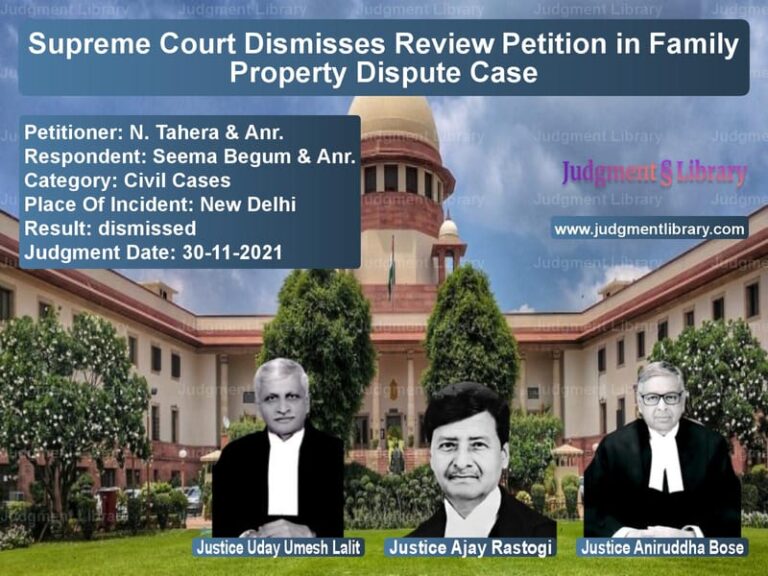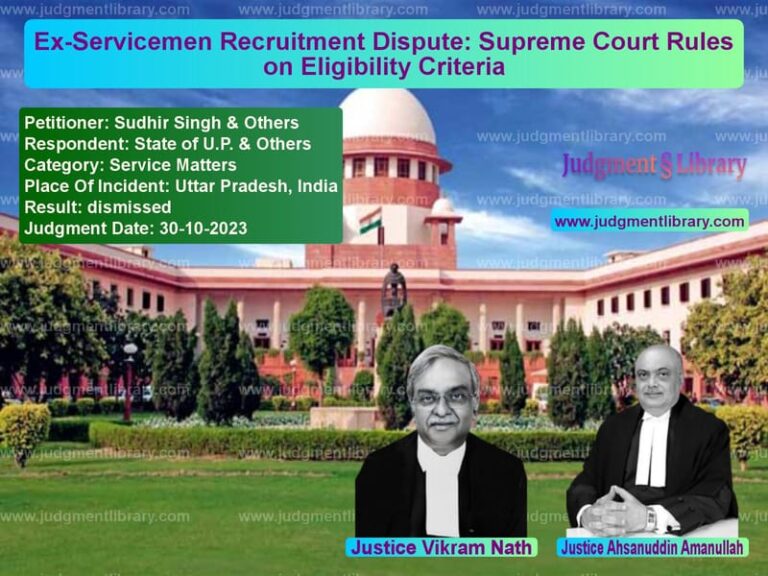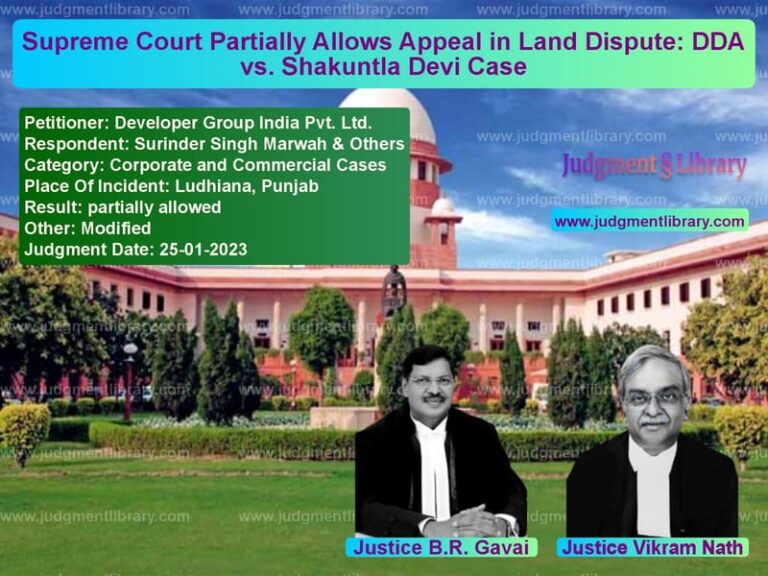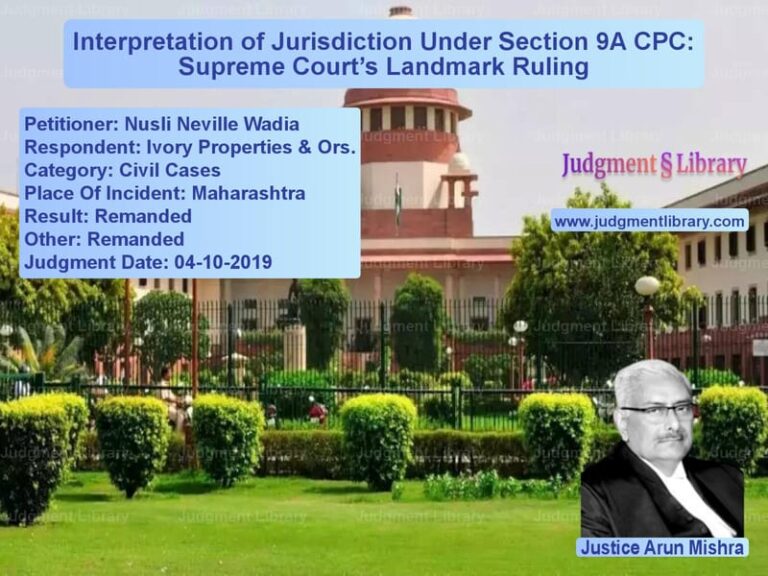Supreme Court Rules on Nominee Rights in Shares: Succession Laws Prevail
The case of Shakti Yezdani & Anr. v. Jayanand Jayant Salgaonkar & Ors. addresses a crucial legal issue concerning the rights of nominees under the Companies Act, 1956 and the Depositories Act, 1996. The Supreme Court was tasked with determining whether a nominee has absolute ownership over shares and securities upon the shareholder’s death or whether such assets must be distributed according to succession laws.
Background of the Case
The case arose after the death of Jayant Shivram Salgaonkar, who had executed a will on June 27, 2011, specifying how his estate should be distributed among his heirs. His assets included fixed deposits worth ₹4.14 crores and mutual funds worth ₹3.79 crores. While nominees were named for these assets, the dispute centered on whether these nominees had absolute ownership or if the assets should be distributed under succession laws.
Legal Issues Raised
- Does nomination under Section 109A of the Companies Act, 1956 grant absolute ownership of shares to the nominee?
- Does a will override a nomination in the case of shares and mutual funds?
- What is the legal effect of the term ‘vesting’ in Section 109A of the Companies Act?
Arguments of the Appellants (Nominees)
The appellants, represented by Mr. Abhimanyu Bhandari, argued:
- The Companies Act, 1956 and Depositories Act, 1996 grant full ownership rights to nominees upon the shareholder’s death.
- The term ‘vesting’ in Section 109A of the Companies Act indicates absolute transfer of ownership to the nominee.
- The presence of a non-obstante clause in the Companies Act overrides succession laws.
- Since the deceased’s will did not specifically mention the nominated shares, it should be presumed that the intent was to transfer ownership to the nominees.
Arguments of the Respondents (Legal Heirs)
The respondents, represented by Mr. Rohit Anil Rathi, countered:
- The Companies Act does not create a new mode of succession.
- Nomination is only meant to ensure smooth transfer of securities and does not override succession laws.
- The nominee is merely a custodian of the shares and must distribute them to the legal heirs.
- The Supreme Court has previously ruled in Sarbati Devi v. Usha Devi (1984) and Vishin N. Khanchandani v. Vidya Lachmandas Khanchandani (2000) that nomination does not grant ownership but only facilitates transmission.
Supreme Court’s Observations
1. Nomination Does Not Override Succession Laws
The Supreme Court ruled that nomination under the Companies Act does not confer absolute ownership but only facilitates transmission. The Court stated:
“The Companies Act is not intended to provide an alternative mode of succession. A nominee is only a custodian and must transfer the securities to the legal heirs of the deceased.”
2. Effect of the Term ‘Vesting’
The appellants argued that the word ‘vesting’ in Section 109A meant full ownership for the nominee. The Court rejected this argument, explaining:
“The term ‘vest’ can have multiple meanings depending on the context. In this case, it only means that the nominee holds the securities in trust for the legal heirs.”
3. Will Takes Precedence Over Nomination
The Court ruled that a validly executed will supersedes a nomination. If the will explicitly bequeaths the shares to a legal heir, the nominee must transfer them accordingly.
4. Non-Obstante Clause Does Not Alter Succession Laws
The appellants argued that the non-obstante clause in the Companies Act overrides all other laws. The Court disagreed, stating:
“The non-obstante clause only ensures that companies can transfer shares to the nominee without legal disputes. It does not grant ownership rights to the nominee.”
Final Judgment
The Supreme Court ruled:
- Nominees under Section 109A of the Companies Act, 1956 and the Depositories Act, 1996 are only custodians, not owners.
- Legal heirs retain the right to inherit shares as per succession laws.
- The deceased’s will, if valid, determines the final distribution of shares.
- The appeal was dismissed, upholding the decision of the Bombay High Court.
Key Takeaways
1. Nominees Are Not Absolute Owners
Being named as a nominee does not mean full ownership; the nominee must distribute assets according to succession laws.
2. A Will Supersedes Nomination
If a shareholder has left a will, it takes precedence over any nomination.
3. The Companies Act Does Not Provide a New Mode of Succession
Succession must follow the Indian Succession Act, 1925, Hindu Succession Act, 1956, or other applicable laws.
4. The Role of a Nominee Is Limited
A nominee only ensures smooth transfer and acts as a trustee for the legal heirs.
Conclusion
The Supreme Court’s ruling in this case clarifies a long-debated issue in corporate law. By reaffirming that nominees are custodians rather than owners, the Court ensures that inheritance laws are upheld. This judgment will impact how companies and investors approach nominations in shares and securities in the future.
Petitioner Name: Shakti Yezdani & Anr..Respondent Name: Jayanand Jayant Salgaonkar & Ors..Judgment By: Justice Hrishikesh Roy, Justice Pankaj Mithal.Place Of Incident: Maharashtra.Judgment Date: 13-12-2023.
Don’t miss out on the full details! Download the complete judgment in PDF format below and gain valuable insights instantly!
Download Judgment: shakti-yezdani-&-anr-vs-jayanand-jayant-salg-supreme-court-of-india-judgment-dated-13-12-2023.pdf
Directly Download Judgment: Directly download this Judgment
See all petitions in Property Disputes
See all petitions in Succession and Wills
See all petitions in Judgment by Hrishikesh Roy
See all petitions in Judgment by Pankaj Mithal
See all petitions in dismissed
See all petitions in supreme court of India judgments December 2023
See all petitions in 2023 judgments
See all posts in Civil Cases Category
See all allowed petitions in Civil Cases Category
See all Dismissed petitions in Civil Cases Category
See all partially allowed petitions in Civil Cases Category







